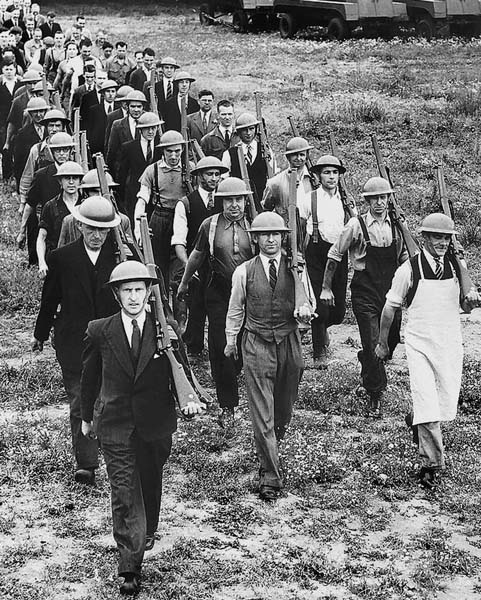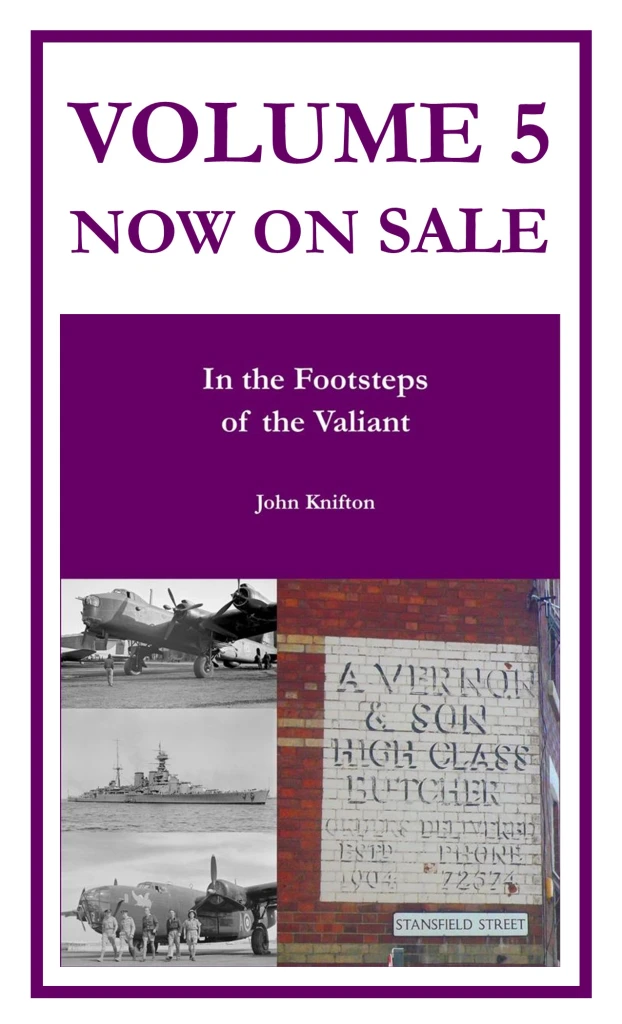All the poems in this particular selection have a flavour of the Second World War. Preparations seem to have started as early as 1922, the year when the eccentric and beloved caretaker, universally known as “Robert”, retired.
Almost totally deaf and a great favourite of the boys, Robert would have his own poems printed and then distributed around the school. Unfortunately, only one of them appears to have survived. On this occasion, he celebrates the school’s Cadet Corps, preparing slowly but surely for the next world war:
“If you look through them gates
You’ll see Captain Yates
A-drilling of boys by the score.
So come on, my lads
Get leave of your dads
And join the High School Corps.”
And here is the High School Corps:

The next poem appeared in December 1943. It celebrates the Home Guard, the amateur soldiers, either too young or too old for the real army, who were tasked with defeating the invading Germans. It was written by Timothy John Norfolk DEAVILLE (aged 9) who was the son of the Reverend R Deaville, the vicar of St Andrew’s on nearby Mapperley Road:
The Home Guard
“Daddy’s in the Home Guard,
He’s helping win the war.
He’s donned a khaki uniform
Just as he did before.
He hasn’t won a medal yet,
He hopes he will do soon.
He’s only been a sergeant
This very afternoon.
His comp’ny’s got a kitten,
He helps to feed it now.
It claws him every morning
And makes him call out, “Ow!”
I’m glad he’s got promotion,
He has more leisure hours.
Commander says he’s clever
(He’s quite a friend of ours).
He hasn’t shot a German yet,
He wants to get a chance.
If “Jerry” tries his funny tricks
He’ll lead them quite a dance.”
Can you spot TV’s Mr Brown in this photograph of an unknown Home Guard unit?
If you remember the song, Mr Brown goes off to town on the 8.21. But he comes home each evening and he’s ready with his gun :
This next poem appeared in April 1945, and it was written by David Brian Bowler of the Science Sixth. It has a bit of a laugh at the various amateur organisations set up by the school to push the Huns straight back into the sea. “J.T.C.” is the Junior Training Corps, L.D.V. stood for the Local Defence Volunteers (or as they were usually called, “Look, duck and vanish”) and the H.G. is the Home Guard.
I don’t know what happened to young David, but I did find two companies where a “David Brian Bowler” is named as a director, shareholder or secretary. They were “Acem Geotechniques Limited” and “Bowler Geotechnical Pty Ltd”, both of them operating in Queensland and Papua & New Guinea.
The poem is called:
“Epic”
“In the grim days they feared the Hun
Would come by air or sea;
At the first observation point
They posted the J.T.C.
Through the chill nights with unknown sounds
Of foes they could not see
They waited, hoping for the chance
To give them ‘ell D.V.
And from those hearty pioneers
By way of L.D.V.,
With drill and guards and tireless work
Came the High School H.G.
First to stand up, last to stand down,
Wherever you may be,
Salute to you, the best of luck,
And thanks to the School H.G.”
Here’s the final parade of the nation’s various Home Guard units, before they were stood down for ever on December 3rd 1944 before being completely disbanded on December 31st 1945.

In December 1940, the Nottinghamian contained a poem entitled
“ODE TO ELSTON (ACCOMPANIED BY WOODPIGEON)”
The title referred to the many boys who took part in a scheme organised by Mr Palmer and Mr Beeby, whereby Sixth Formers went off to work at three different agricultural locations, for the most part helping to get the harvest in. One farm was at Elston, a small village south west of Newark-on-Trent, another was at Car Colston north east of Bingham and the third was at Honey Lane Farm at Farndon which is also near Newark-on-Trent. On other occasions, boys went to a farm camp at Dowsby, just the far side of Grantham. Ooooh aargh:
“ODE TO ELSTON (ACCOMPANIED BY WOODPIGEON)”
‘S nice to be in the country
When summer suns are glowing ;
‘S nice to milk the brown cows—
‘S nice.
Cycle out to farmyard
Six o’clock in morning ;
Sweat and sweat and drink tea—
S’wet.
‘S nice to ‘staak’ the barley,
‘S nice to pick the oats,
‘S nice to staak the wheat,
‘S nice !
‘S nice to load the ‘cow-muck’ ?
‘S nice to pump the water ?
‘S nice to be in country
But it’s nicer to be in town !

The poem was written by Philip Blackburn of 6 Classics. He left the school in 1941 with a Studentship for Classics at University College, Nottingham, and a Nottingham Co-operative Society Scholarship of £25 per annum.






I like the one “Daddy’s in the Home Guard” by Timothy nine YO. Very neatly crafted. I wonder what happened to him. With a parent like that he’s either a Bishop or a leader of the local Communist Party.
I googled “Timothy John Norfolk Deaville” and the only place he turned up was in “The Gazette”, the civil service publication, which announced that in 1956 as a cadet doing his National Service, he had been promoted to Second Lieutenant. Perhaps he then went on to a career in the military. The fact that is not mentioned more would imply for me that he never became a bishop, because they usually crop up somewhere on the internet, or even the leader of the local Communist Party,for the same reason.
When I tried just Timothy Deaville, I found just one, living in Southampton with Jette H Deaville. “Jette” apears to be a woman’s name from Scandinavia, possibly Denmark.
Thank you for all of your research.
History as it was lived. Don’t know Mr Brown 🙂
Mr Brown occurs in the song at the beginning of each episode of “Dad’s Army”, as the arrows confront each other across the Channel:
“Mr Brown Goes Off To Town
On The Eight Twenty-One
But He Comes Home Each Evening
And He’s Ready With His Gun
So Watch Out Mr Hitler
You Have Met Your Match In Us
If You Think You Can Crush Us
We’re Afraid You’ve Missed The Bus
‘Cause Who Do You Think You Are Kidding Mr Hitler
If You Think Old England’s Done?
Thank you for this, John. I have to confess I have never watched other than clips of the programme 🙂
They show just how much your history means even to schoolchildren!
Yes, it certainly does. My theory is that they are all so interested in history because they are so keen not to repeat it !
off topic – On my 4th of July post, I’ll be putting a link on it from Ballaadeer. I’m doing this with you especially in mind. I think you’ll like it!
That is extremely kind of you. I’m looking forward to it, already!
Dad’s Army did a large disservice to the Home Guard. Units in the larger towns and cities (like Nottingham) comprised men who had seen action in the Great War; fit 40-somethings in reserved occupations. A far cry from the doddery buffers of Walmington on Sea.
You should watch the last scene of the last episode.
I’ve just watched it and you could not have found a better summary of how Englishmen (and Scotsmen) feel about defending their country. As somebody once said:
“”We shall fight on the beaches, we shall fight on the landing grounds, we shall fight in the fields and in the streets, we shall fight in the hills; we shall never surrender.”
And we won’t surrender if the occasion ever crops up again.
I think that the Home Guard was bound to have large variations insofar as they extended over the whole nation.
My Dad was in the Home Guard while he waited for the RAF to contact him and he said they were very amateurish and would not have held the Germans up for very long. The ones who were more “professional” could be dangerous. A TV programme was on years ago which showed how many innocent people were shot and killed because they did not respond quickly enough to a HG challenge.
Set against this is the fact that the HG, particularly in London, had 1,206 men killed on duty or died from wounds and 557 more suffered serious injuries.
I think that is Sergeant Wilson at the front.
The Home Guard certainly got a lot of bad press and reducible. But, they were determined and willing, for that we must give them credit.
Absolutely. We must never forget the determination of the men, and women, who volunteered to put their lives on the line for this country of ours. And if the Germans had made it past the RAF, we would have given them a terrible time.
Most definitely!
The feroccity of the German defencee in late 1944/45 (particularly once the details of the abortive Morgenthau Plan for a post-war Germany had been revealed) give an idea off what an invasion force could have expected on the beaches of Kent and Sussex in 1940.
I liked Robert’s poem. Timothy’s poem made me smile. I liked David’s and the last one too. Thank you for sharing.
I was reading this post and the monsters reminded me of your posts. 😊
https://laurashovan.com/2021/07/poetry-friday-from-the-black-lagoon/
I’m glad you enjoyed the poems, Lakshmi. Thank you for the link, I found it very interesting. I know very well the film being referred to, “The Creature from the Black Lagoon”. I didn’t realise that the monster’s costume was designed by a woman. What an awful thing that her boss denied all credit for it.
John, most of the hats on those kids in the first picture are too big for them. And as for the last photograph, it took me away. I also did enjoy the poetry even if it is about war. Thank you for sharing this post.
My pleasure, Amy, I’m glad you enjoyed it!